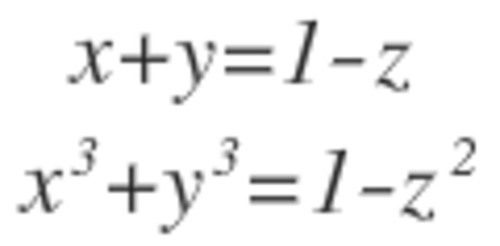"PURE" AND "NON- PURE TRIPLETS"
 If x,y,z are integers satisfying the equations given above simultaneously with the condition that sum of x and y is never zero, and if the number of ordered "PURE TRIPLETS" (x,y,z) is A and the number of ordered "NON-PURE TRIPLETS" (x,y,z) is B, then find (A+B)(A-B).
If x,y,z are integers satisfying the equations given above simultaneously with the condition that sum of x and y is never zero, and if the number of ordered "PURE TRIPLETS" (x,y,z) is A and the number of ordered "NON-PURE TRIPLETS" (x,y,z) is B, then find (A+B)(A-B).
NOTE: 1. We define "PURE TRIPLETS" (x,y,z) as the ones in which ALL of x,y,z are NON-NEGATIVE INTEGERS. 2. We define "NON- PURE TRIPLETS" (x,y,z) as the ones in which x,y,z are NOT ALL non-negative integers
EXAMPLE: (9,8,7) is a "PURE TRIPLET". (-9,8,7) is a "NON-PURE TRIPLET"
NOTE: ORDERED TRIPLET means (1,2,3) IS NOT SAME AS (1,3,2) or (2,1,3) or (3,2,1).
The answer is 8.
This section requires Javascript.
You are seeing this because something didn't load right. We suggest you, (a) try
refreshing the page, (b) enabling javascript if it is disabled on your browser and,
finally, (c)
loading the
non-javascript version of this page
. We're sorry about the hassle.
 Abc Xyz
Abc Xyz